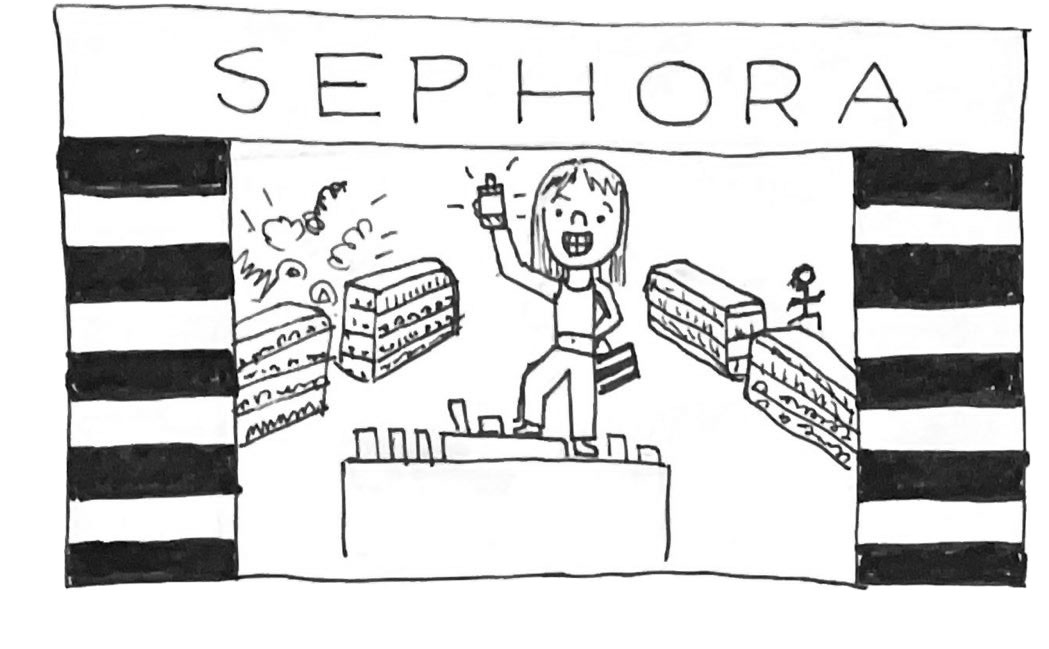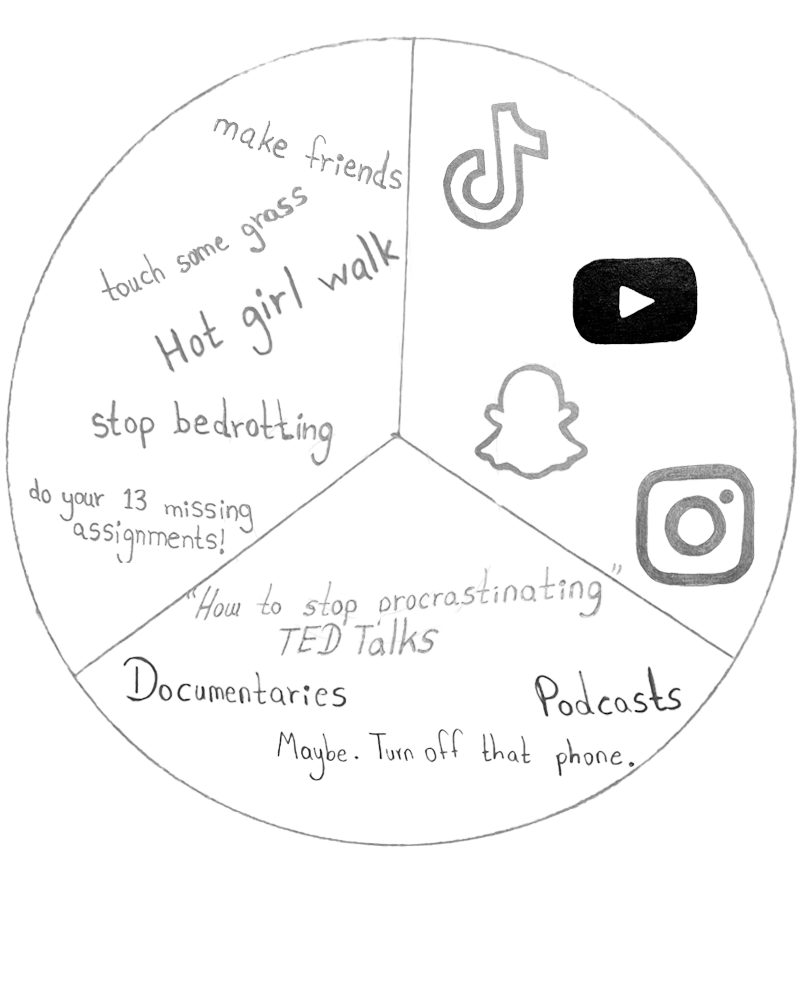The infamous – 10-year-old “Sephora kid” raiding makeup and skincare isles while picking fights with innocent employees and fellow customers – has become a topic of viral story time videos on TikTok. While these tweens have concerned older generations, Gen Z social media influencers and the questionable parenting of Millennial parents may have incited the Sephora Kid apocalypse.
Millennials:
Generation Y, or millennials, are partially to blame for the droves of tweens devastating Sephora, but how did they let this spiral and why? Well, like any parent, their strategy for raising their kin is informed by the methods of their own parents. Millennials were parented primarily by Baby Boomers and the earliest cohorts of Generation X. Their childhoods were often under the over-extensive form of “helicopter parenting” popularized by Boomers. Helicopter parenting is the strategy of constant attendance to a child’s well-being; hovering over them like a helicopter. Problems with this arose with their overbearing, emotionally distant, and often authoritarian implementation. These parents only cared about the physical comfort of their children rather than being both physically and emotionally invested. If the child had a roof and bed, got home by 5 pm, wore their seatbelt, and went to bible study then that meant they were fine. Any emotional disturbances were either ridiculed, ignored, or downplayed by Boomer parents. Going into adulthood, millennials felt overburdened by their parents or emotionally deprived. As such, the methods of the boomers rippled into millennial parenting. This ripple created an overreaction in which these young parents couldn’t appropriately and healthily manage their children, resorting to barely or not managing their kids at all.
Millennials take on a parental strategy known as gentle parenting. Gentle parenting is characterized by a softer, hands-off approach to parental duties and a mutual understanding and respect of boundaries and well-being in a punishment-free environment. This is where greater society comes into play.
Millennials are experiencing burnout. Overburdened with work, life, the economy, and the very way they parent, they suffer from stress and fatigue which forces them into semi-reclusion from their responsibilities as parents. Millennials came into the workforce after finishing their academically stacked college years. As new members of the workforce and academically ahead, many of them expected an easy transition into labor but were met with a reckoning. Beyond an economy which would continuously falter, financial impounding progressively made living an economically free life like their parents hard for many; with rising housing prices and the same wages. Once kids arrived, their lives would be stretched thin. Millennials are often overworked and once they come back to their homes, they are too tired to be emotionally available to their children. This cascades into substituting parenting with electronics and other people. Generation Alpha relegates their time and home education to screens instead of their parents and whenever they’d go on family outings it’s more expected to be extra-courteous to Gen Alpha kids who were never taught proper manners or social skills. While millennial parents may claim that their kids’ Sephora craze is like any other generation or because Claire’s and other 90’s and 00’s era tween beauty stores have fallen off the map, the most likely reasoning is their kids’ screen time. Such screen addiction has led to the extensive online presence of Gen Z today.
Gen Z:
Gen Z, zoomers, and Garfield students, are the last generation to have a “normal” childhood. Technology played a minor role in Gen Z’s childhood, only beginning to have a significant impact once Gen Z matured past elementary school. With Gen Z being teenagers and young adults, they are now responsible for shaping popular culture and what’s considered “cool”.
Social media has expedited the process of spreading information online. Around 60% of TikTok users are Gen Z, making them the main dictators of trends in fashion, media, and makeup. Older Zoomers now have incomes of their own, allowing them to buy a variety of products that they subsequently promote on the internet. Brands are also sending free products to influencers for endorsements and wonder exposure. The rapid trend cycles of today have incited a culture of mass consumerism, which is now reaching younger generations like Gen Alpha.
Now that Gen Z is no longer the youngest generation, they are already looking for anti-aging solutions. Plastic surgery like botox and fillers are dramatically skyrocketing in popularity, with plastic surgeons noticing their clients getting increasingly younger. For people looking for less invasive anti-aging techniques, Gen Z has taken a greater interest in expensive skincare, therefore influencing younger generations, like Gen Alpha, to follow suit.
Gen Alpha:
As the oldest Gen Alpha kids enter middle school, they have been a subject of concern for Millennial and Gen Z adults and teens on social media. Now, Sephora Kids have become the main subject of ridicule amongst older generations.“I’m a sister of a Sephora child and they can be mean and judgy,” one Garfield student said. In addition to their bad attitudes, employees have criticized these kids for their lack of store etiquette. Sephora employees have witnessed these kids picking fights with fellow customers over products and shared videos of trashed sample displays to TikTok. While the overall criticism of Sephora kids is their impolite attitude and lack of discipline, most of the online hate has been targeted at these kids specifically. However, the state of Gen Alpha is a product of their upbringing.
Gen Alpha, born between 2010 to 2024, has grown up in the age of easily accessible technology and social media. While this has fostered widespread media literacy amongst the youngest generation, Gen Alpha and Gen Z have also fallen victim to the negative effects of social media. With millions of influencers constantly encouraging users to indulge and buy into the newest trends, young tweens are especially susceptible to the consumerist culture.
The rise of the “Clean Girl” aesthetic on TikTok has popularized luxury skincare. Influencers, without any dermatological knowledge, have constructed anti-aging skincare regimens, featuring products from Drunk Elephant and Glow Recipe. These products are packaged with bright colors and obscure wording, intriguing young shoppers while deceiving their parents into buying these products for their kids. However, many popular products that Sephora Kids seem to gravitate towards include harsh chemicals that can hurt their young skin. Without proper knowledge of skincare, Sephora Kids may be damaging their skin barrier, rather than fixing it. When every storytime on TikTok is detailing Sephora horror stories, it is easy to forget that Sephora Kids are just impressionable tweens.
Graphic by Tia Lam







